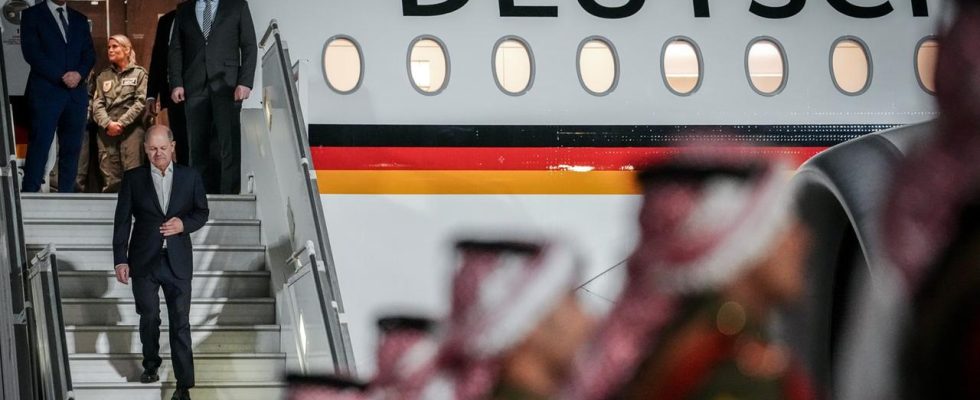There is great concern about further escalation in the Middle East. Chancellor Scholz now wants to mediate in Jordan and Israel. He warns of an impending humanitarian catastrophe if Israel begins its ground offensive in Rafah.
Illuminated palm trees, plus the Jordanian and German flags at Aqaba airport. The Chancellor’s plane landed on Saturday evening. Chancellor Olaf Scholz walks across the red carpet to the waiting vehicles while the guard of honor salutes.
The city has Jordan’s only seaport – and Aqaba is actually a popular spot for divers on the Red Sea. But today it’s about nothing less than an attempt to prevent a humanitarian catastrophe, emphasizes Scholz. He warns of the “danger that a comprehensive offensive in Rafah will result in very large numbers of terrible casualties.” This must be avoided at all costs.
Evacuation of people from Rafah is still completely unclear
Rafah is located in the very south of the Gaza Strip – many people are crowded into a small space there, many have fled there from the north. People, as Foreign Minister Annalena Baerbock once said, who cannot now disappear into thin air.
Despite harsh criticism even from the United States, Israeli Prime Minister Benjamin Netanyahu’s office announced just this week that the head of government had approved an offensive. Civilians are supposed to be evacuated. But it is unclear how this could happen.
Gray areas: Built-up areas in the Gaza Strip, hatching: Israeli army
Meeting with Jordanian King Abdullah II
Shortly before leaving for Jordan, the Chancellor emphasized once again that Germany is on the side of Israel, which is ultimately only defending itself. “And Israel has every right to defend itself against Hamas’ attack,” explains Scholz. At the same time, it is about observing the rules of international law. Civilian casualties must be avoided. And it’s about getting humanitarian aid to Gaza.
In the morning, Chancellor Scholz met the Jordanian King Abdullah II in his private residence in Aqaba. The king is seen as an important link between the Arab world and Israel’s Western allies.
Scholz: Airlift is not the best way
Since this weekend, the German Air Force has also been taking part in dropping aid supplies over the Gaza Strip from Jordan with two transport planes. However, aid organizations warn that this is expensive, dangerous and inefficient. More deliveries by land are needed.
Scholz sees it that way too. Of course, this procedure is not the best way. That would be the case if more trucks made it into the Gaza Strip by land. A visit to the Jordanian air force base from which the planes take off is not planned.
It was only in the middle of the week that Defense Minister Boris Pistorius gave the green light for the participation of two German “C-130 Hercules” transport aircraft. Then it happened relatively quickly. On Saturday, a plane took off for its first mission, as the Air Force announced via the online service X: “The crews have a lot of experience and are very well prepared for the dangerous mission.” The machine dropped four tons of food. The four pallets were “delivered precisely” from a height of around a thousand meters.
Humanitarian aid, ground offensive in Rafah and perspectives
More humanitarian aid, no ground offensive in Rafah, a long-term perspective for the region – all topics that Scholz wants to discuss with Israeli Prime Minister Netanyahu after his onward flight from Jordan to Tel Aviv. Talks are also planned with President Izchak Herzog and opposition politician Benjamin Gantz from the so-called war cabinet.
The Chancellor also meets relatives of kidnap victims. It’s about supporting them and understanding their point of view. The first step to freeing the hostages is to agree to a quick ceasefire. To do this, you have to pick up the pace, says Scholz.
Kai Clement, ARD Berlin, tagesschau, March 16, 2024 11:00 p.m

